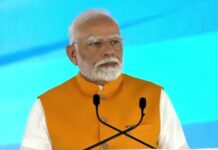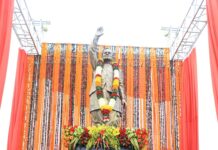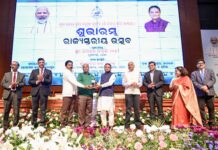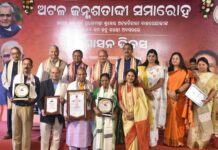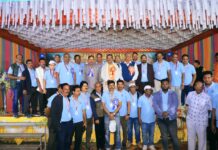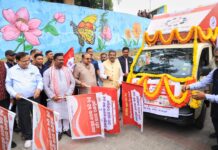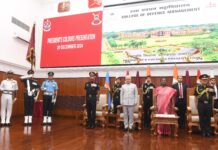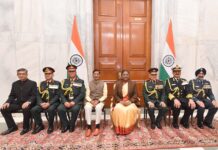By Our Correspondent
NEW DELHI: The Vice President, M. Venkaiah Naidu said on Friday that Veer Savarkar was a multidimensional personality – a freedom fighter, social reformer, writer, poet, historian, political leader and philosopher – all combined into one.
Releasing the book – ‘Savarkar: Echoes from a Forgotten Past’, in New Delhi today, the he opined that there are many facets of Veer Savarkar’s personality that remain under appreciated.
“Very few in India know that Veer Savarkar started one of the most powerful social reform movements against untouchability in India”, Shri Naidu said adding that Savarkar built Patit Pavan Mandir in the Ratnagiri district to allow entry to all Hindus, including Dalits. “He was the first to envision a casteless India”, the Vice President said.
Highlighting that it was Veer Savarkar who named the 1857 rebellion as the first war of independence, Shri Naidu called for the right sense of history that is reflective of Indian values.
The Vice President also listed what Veer Savarkar called as Seven Shackles of the society. Enumerating these shackles, VP said that Veer Savarkar condemned these “seven swadeshi fetters” as they were dividing society. The seven Shackles described by Savarkar are –
First, the rigid caste system which, according to Savarkar, “deserves to be thrown into the dustbins of history”.
The second reform Veer Savarkar wanted was to popularize Vedic literature to everyone, not only to a particular caste. He called Vedic literature civilizational knowledge for the entire human race and India’s unique gift to mankind.
The third was to break away from caste-based vocational rigidity and encourage persons to pursue any vocation of their choice based on aptitude and ability. In the absence of motivation of competition, or lack of aptitude, Savarkar believed, “merely following what one’s father did, will make one both complacent and unproductive.”
Fourth, Savarkar believed in global mobility and the need for Indians to venture out into foreign lands so as to “bring back the best of the world and carry the fragrance of India and her culture to every corner of the globe.”
Fifth, Savarkar wanted to break away from the taboo on inter-caste dining. He had said, “Religion is in the heart, the soul, the spirit; not the stomach!”
The sixth was promotion of inter-caste marriage
The seventh aspect, Veer Savarkar underscored was the need to develop a scientific temper. “We are 200 years behind Europe”, he had remarked adding, “It is through science, modern thoughts and industrialization that we can ensure that every man woman in India will have a job to do, food to eat, clothes to wear and a happy life to lead.”
The Vice President called Savarkar’s far-sighted vision of India’s future development as ‘truly remarkable’. Recounting the innumerable sufferings faced by Indian freedom fighters, he appealed to everyone to visit the Cellular Jail at least once in their lifetime.
Noting that it is not easy to write a biography, sepecially of a person as illustrious and as controversial as Savarkar, the Vice President complimented the author, Dr. Vikram Sampath for a very well researched and extremely well written account of Savarkar’s life and message.
“The book by Dr Sampath brings out these remarkable visionary ideas of Savarkar in a very compelling manner. After we put down the book, we see Savarkar in a new light”, he said.
Author of the book, Dr. Vikram Sampath, Rajya Sabha Member, Dr. Sonal Mansingh, Secretary General, Rajya Sabha, Desh Deepak Verma, Secretary to Vice President, Dr. I.V. Subbarao, Chairman, Prasar Bharati, Dr. A. Suryaprakash, Meghnath Desai, SSanjeev Sanyal, Ranjeet Savarkar were among the dignitaries who grace the occasion.


